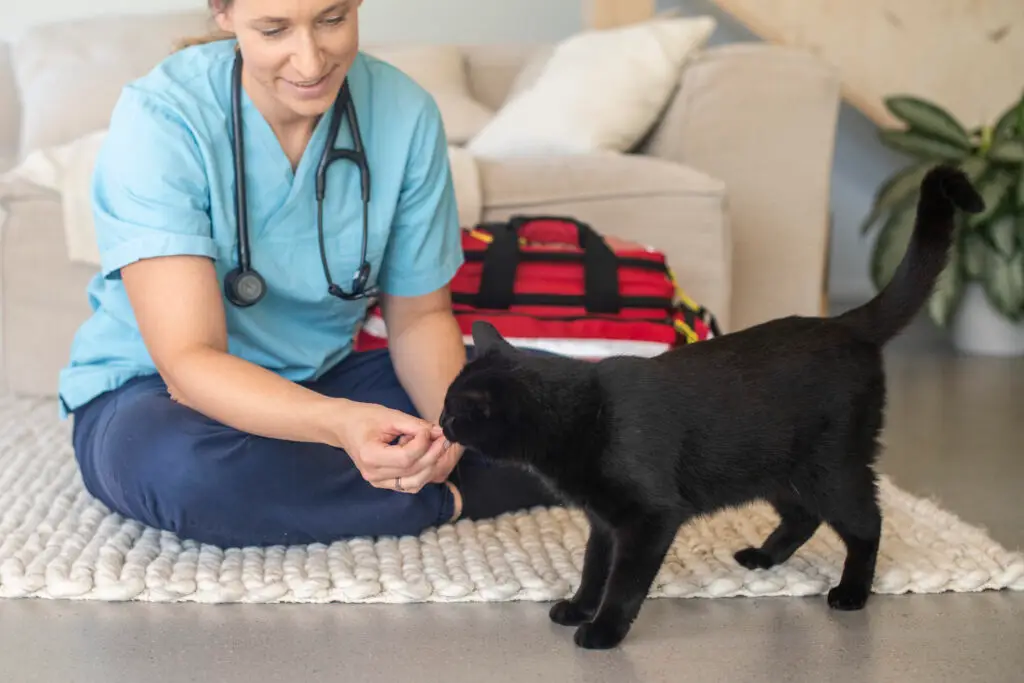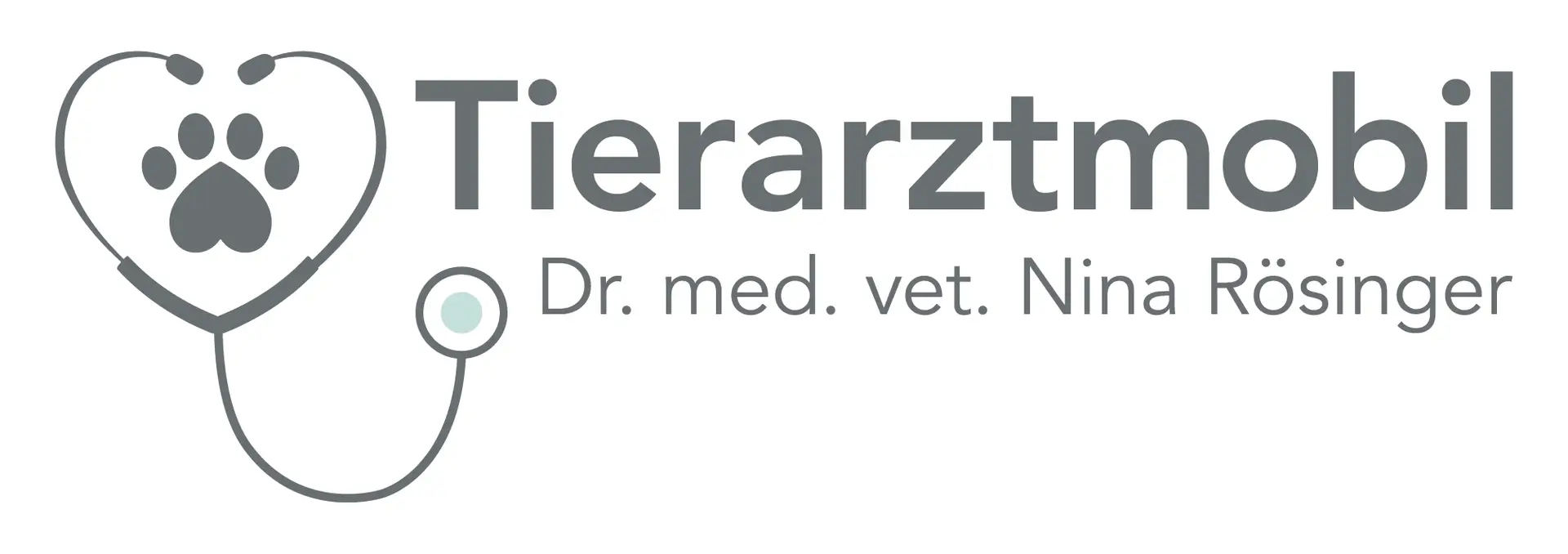
Vaccines
Wellness check-up
Travel consult
FAQ on cat vaccinations
Do I have to vaccinate my indoor-only cat?
Some Vaccines are also recommended for indoor-only cats. However, the frequency of booster vaccinations is of course much lower due to the lower risk of infection. If indoor cats have no contact with other cats (as they would in an outdoor enclosure or in a cat hotel), one vaccination every 2-3 years is usually sufficient after the basic immunisation has taken place. However, a health check at least once per year is recommended so that any illnesses can be detected and treated at an early stage.
Do I need to vaccinate my cat every year?
The frequency of booster vaccinations depends on the individual risk factors (does the cat go outdoors, does it visit a boarding facility, how many cats live in the household, etc.). At the vaccination appointment, we will discuss your cat's circumstances and draw up an individualised vaccination plan for the coming years. So that your cat enjoys optimal protection, but is only vaccinated as little as necessary.
How often should I deworm my cat?
The frequency of worming depends on the cat's lifestyle and therefore its individual risk factors. During the vaccination consultation, we discuss these risk factors and draw up an individualised worming plan. Alternatively, there is also the option of regular faecal checks. I will be happy to advise you on this.
What are the side effects of vaccines in cats?
Every medical intervention always has a risk of unwanted side effects. With cat vaccinations, serious side effects are extremely rare. The most frequently described are tiredness, a slightly reduced appetite and pain at the injection site, which usually normalises again after a day.
Should you have any concerns regarding vaccination, don't hesitate to contact me. I'm happy to discuss your individual situation.
Is there a vaccine against cat cold / cat flu?
Cat flu can be caused by a variety of bacteria and viruses (often in combination with each other). Vaccination is currently possible against herpes and caliciviruses and is also recommended for all cats. Vaccination does not protect against infection, but against a severe course of the disease.
I'm happy to advise you on your cat's individual situation. Contact me anytime.
Should I wait to let my cat go outside until it has had its vaccines?
It is advisable to wait until the cat has been sufficiently vaccinated before releasing it. This depends on how old the cat is and how often it has already been vaccinated. It is also essential to wait until the cat has been neutered.
It is generally advisable not to let young cats out too early anyway. The smaller they are, the more likely they are to become victims of cat fights or other dangers. If you are unsure about your individual situation, contact me! I'm happy to advise in your individual situation.
Which vaccinations are mandatory for cats in Switzerland?
If your cat only stays within Switzerland, there are no legally required vaccinations. When crossing the border, your cat needs a valid rabies vaccination (at least 21 days before crossing the border), a microchip (implanted before the rabies vaccination) and a pet passport. Additional regulations may apply depending on the country of destination.
However, vaccinations are also recommended for cats that only live in Switzerland in order to protect them from infectious diseases. Vaccination against panleukopenia and cat cold/cat flu (herpes and calicivirus) is recommended for all cats - either annually or every 2-3 years, depending on the circumstances. Vaccination against leukemia virus (FeLV) is recommended for cats that are allowed outdoors or that may meet other cats of unknown vaccination status (e.g. in boarding facility).
Should I have my cat tested for leukemia virus (FeLV) before vaccination?
A leukemia virus test (FeLV antigen test) is recommended before the first vaccination. A droplet of blood is required for the test, and at the same time the cat is also tested for the FIV virus. The information about the FeLV status is very important, as FeLV-positive cats are not allowed to go outdoors and also have a reduced life expectancy and will require good management of their disease in order to stay healthy for as long as possible. FeLV-positive cats also do not require FeLV vaccination.
What is the vaccination schedule for cats?
When drawing up an individual vaccination plan for your cat, I am primarily guided by the recommendations of the Swiss Association for Small Animal Medicine SVK. However, the findings from international vaccination recommendations such as those of the WSAVA (World Small Animal Veterinary Association) are also important.
The individual risk factors and circumstances of your cat determine the vaccination recommendation that I formulate in your case.
My cat is not feeling well. Can we vaccinate anyway?
Vaccination should be postponed in the event of an acute illness. Firstly, the additional strain on the immune system should be avoided; secondly, the immune response to the vaccination may be weakened by additional infections, which reduces the protective effect of the vaccination.
If your cat suffers from a chronic illness, the vaccination must be discussed on a case-by-case basis.
FAQ on dog vaccinations
Do I need to vaccinate my dog?
The only legally required vaccination for dogs is a rabies vaccination if they cross the border. Dogs living in Switzerland do not otherwise have to be vaccinated by law, but it is of course highly recommended to protect their health.
Because most dogs in Switzerland are vaccinated nowadays, we fortunately hardly ever see diseases such as distemper or hepatitis contagiosa canis any more. To keep it that way - and because these diseases keep coming back to Switzerland through dog imports - a good vaccination plan for your dog is important and correct.
Do I need to vaccinate my dog every year?
Vaccination against parainfluenza and leptospirosis should be carried out annually, as the vaccination protection unfortunately only lasts for that long. Vaccinations against distemper, hepatitis contagiosa canis / adenovirus and parvovirus provide protection for over 3 years in most dogs. These vaccinations are therefore only given every 3 years (or after an individual antibody titre test).
Whether additional vaccinations are recommended for your dog and how often they should be given depends on the individual risk factors. At the vaccination appointment, we will discuss your dog's circumstances and draw up an individualised vaccination plan for the coming years. So that your dog enjoys optimal protection, but is only vaccinated as little as necessary.
How often should I deworm my dog?
The frequency of worming depends on the dog's lifestyle and therefore its individual risk factors. During the vaccination consultation, we discuss these risk factors and draw up an individualised worming plan. Alternatively, there is also the option of regular faecal checks. I will be happy to advise you on this.
What are the side effects of vaccines in dogs?
Every medical intervention always has a risk of unwanted side effects. With dog vaccinations, serious side effects are very rare. The most frequently described are tiredness, a slightly reduced appetite and pain at the injection site, which usually normalises again after a day.
Should you have any concerns regarding vaccination, don't hesitate to contact me. I'm happy to discuss your individual situation.
Does my dog need a kennel cough vaccine?
Kennel cough is caused by a variety of viruses and bacteria (often in combination with each other). It is not possible to vaccinate against all of these pathogens. Generally, all dogs are vaccinated against canine adenovirus and parainfluenza virus. In addition, a nasal vaccination or oral vaccination can be given, which also protects against the Bordetella bronchiseptica bacterium.
Whether the additional nasal/oral vaccination against kennel cough is recommended for your dog depends on his/her living conditions and individual risk factors (e.g. dog sports, puppy playgroup, doggy daycare or boarding facilities).
I'm happy to advise you on your dog's individual situation. Contact me anytime.
Is my dog allowed to puppy play group / doggy day care before finishing their puppy vaccinations?
It is recommended that young dogs should not be allowed to play in large groups of dogs until they have had at least 2 vaccinations (at least one of which must be at over 16 weeks of age) and the second of these vaccinations must have been given more than 2 weeks ago.
Which vaccines does my dog require for travel outside of Switzerland?
When crossing the border, your dog needs a valid rabies vaccination (at least 21 days before crossing the border), a microchip (implanted before the rabies vaccination) and a pet passport. Additional regulations may apply depending on the country of destination.
It is also essential to consider infectious pathogens that your dog may be exposed to in your holiday destination (e.g. leishmaniasis, heartworm, piroplasmosis, ehrlichiosis). Most diseases can be prevented with good protection against vectors (sand flies, mosquitoes, ticks). Bear in mind that the tick protection you use for your dog in Switzerland is often not sufficient to protect against other biting insects!
I'm happy to advise you on your upcoming vacation. Please contact me well ahead of time, because depending on your chosen holiday destination, some time-sensitive regulations will need to be fullfilled (e.g. rabies antibody testing).
If my dog has missed his booster shot, does he need another course of primary immunisation?
The vaccines against parvovirus, hepatitis contagiosa canis / adenovirus, parainfluenza and distemper provide good protection in adult animals even when administered only once, so it is sufficient to simply repeat the vaccination as soon as possible.
As the leptospirosis vaccine is not a live vaccine and the immune response generated is therefore not quite as good, a renewed basic immunisation is recommended (2 vaccinations at intervals of 3-4 weeks), provided the last leptospirosis vaccines took place over 18 months ago.
A single rabies vaccination is also sufficient to restore protection. However, if the rabies vaccination is not administered within the validity period of the last rabies vaccination, the statutory waiting period of 21 days applies again before crossing the border is permitted.
What is the vaccination schedule for dogs?
When drawing up an individual vaccination plan for your dog, I am primarily guided by the recommendations of the Swiss Association for Small Animal Medicine SVK. However, the findings from international vaccination recommendations such as those of the WSAVA (World Small Animal Veterinary Association) are also important.
The individual risk factors and circumstances of your dog determine the vaccination recommendation that I formulate in your case.
My dog is not feeling well. Can we vaccinate anyway?
Vaccination should be postponed in the event of an acute illness. Firstly, the additional strain on the immune system should be avoided; secondly, the immune response to the vaccination may be weakened by additional infections, which reduces the protective effect of the vaccination.
If your dog suffers from a chronic illness, the vaccination must be discussed on a case-by-case basis.
